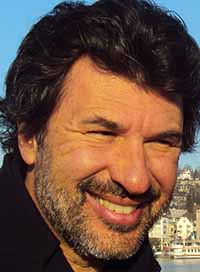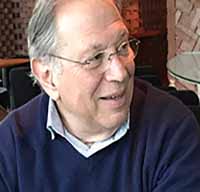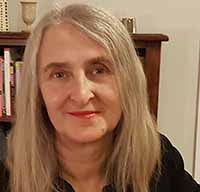IPA Webinars 2022
Is pleasure still a key concept for psychoanalysis?
Theoretical-clinical perspectives of our practice
Panellists: Nelson Ernesto Coelho Jr, Joseph Newirth, Rachel Chaplin
Moderator: Elizabeth Danze
There will be a post-webinar discussion group that you are invited to on our IPA LinkedIn Group Discussion page.
To join the LinkedIn discussion go to: https://www.linkedin.com/groups/14048609/
Since its creation, psychoanalysis revealed the relevance of pleasure as a crucial element in neurosis and its links with repression. Since 1920 this role was offset by new formulations on psychic dynamism. Today, one hundred years later, three psychoanalysts discuss the predominance of this category in phenomena related to the body, trauma, and the psychoanalytic setting in this webinar.
 Nelson Ernesto Coelho Jr., PhD (Sao Paulo, Brazil)
Nelson Ernesto Coelho Jr., PhD (Sao Paulo, Brazil)
Is a professor and a researcher at the Institute of Psychology of the University of Sa ̃o Paulo, Brazil. A psychoanalyst, he is currently directing research into the history and philosophy of psychology and psychoanalysis. He is also a consultant for research foundations and scientific journals. Among his recent publications are articles in Culture & Psychology, Revista Brasileira de Psicanalise and Terapia Psicológica (Chile).
Title: Pleasure and Vitalisation in Analytic Process
From a different point of view, pleasure is still a key concept for psychoanalysis. In contemporary theories following reactivate the importance of pleasure as a concept and an element of body/psychic experience in the analytic process. The emphasis here is on activating effective, vitalising presences in the field of the analytic relationship. This presentation suggests that we consider the basis of the analytical process as a body/psychic continuity. A co-corporeality, material and energetic fabric are also mobile and unstable, moved by messenger drives and marked by internal and external intensity interference, constituting a field of forces, pleasure, distress and proto-meanings.
 Joseph Newirth, PhD (USA)
Joseph Newirth, PhD (USA)
Is a professor at the Derner Institute of Advanced Psychological Studies at Adelphi University, in Garden City, New York. He is the former director of the Postdoctoral Program in Psychoanalysis and Psychotherapy at Adelphi University. He has taught and supervised psychoanalytic candidates at the New York University Postdoctoral Programme in Psychotherapy and Psychoanalysis and the National Institute for Psychotherapies. He has presented numerous papers integrating relational psychoanalysis, object relations, and Lacanian theory with clinical practice. His book, Between Emotion and Cognition: The Generative Unconscious (Other Press, 2003), received the Gradiva Prize. He is currently working on a new book, From Sign to Symbol: Transformational Processes in Psychoanalysis, Psychotherapy and Psychology (Rowman & Littlefield). His practice is in New York City.
Title: Pleasure in the Transitional Space: Intersubjectivity and Transformation
This lecture begins this discussion by reviewing psychoanalysis’ conflicted relationship with pleasure as both a desired and feared goal. Freud implicitly changes his stance on pleasure as he elaborates the meaning of his Grandson’s Forte Da game, suggesting that pleasure is necessary for the mastery of loss and trauma. I will highlight several current theoretical aspects of pleasure, including a phobic attitude towards pleasure and the experience of confusion and doubt within the transference countertransference relationship resulting from shared moments of pleasure. I suggest that shared experiences of pleasure, including humour, are inherent aspects of change in psychoanalysis and psychotherapy. They allow externalised disowned parts of the self to become internalised as active, meaningful subjective experiences.
 Rachel Chaplin (England)
Rachel Chaplin (England)
Is a Training and Supervising Analyst of the British Psychoanalytic Society. She is Honorary Associate Professor at University College, London where she teaches and convenes seminars on French psychoanalysis and ‘Literature and Psychoanalysis’ for the MSc in Theoretical Psychoanalysis. She has published on psychic bisexuality and on the necessity for representational pleasure in response to trauma.
Title: In defence of ‘the bonus of pleasure’, the engine of the talking cure
Wordsworth noticed that ‘in describing any passions whatsoever… the mind will as a whole be in a state of enjoyment’. In my talk I will explore the significance of this puzzling state of enjoyment – there is pleasure to be had in describing even terrible passions? Referring to the work of a psychoanalyst, Piera Aulagnier, and a poet, Elizabeth Bishop, I will suggest that a necessary ‘bonus of pleasure’ sustains our investment in the work of psychic representation. From the first bodily encounters between infant and mother primal psychic representations emerge, suffused with reciprocal pleasure or unpleasure, affects which then colour the subject’s relation to the act of representation itself at all levels of the mind. A traumatic excess of unpleasure can result in what Aisenstein calls flat, ‘dismal speech’, devoid of play, movement and affect. I suggest that in the talking cure, it may sometimes be talking itself that needs to be cured so that analytic speech can start to do its transformational work, re-sizing and delimiting trauma. If the aim of analysis is to produce an optimally articulate psyche, capable of internal dialogue about its fantasies, dreams, experiences, then pleasure must remain a ‘key concept’.